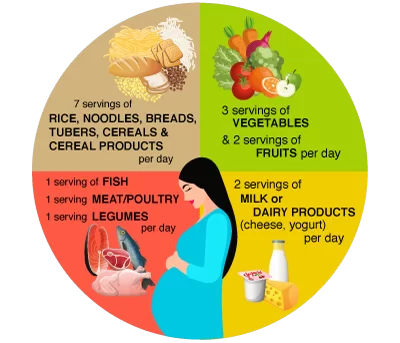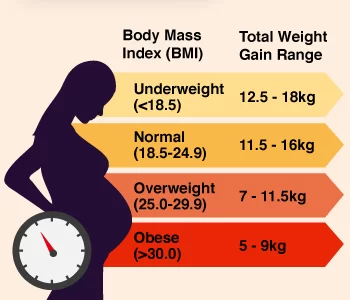Eat Right during Pregnancy
Aug 5, 2020
Introduction
Pregnancy is an exciting journey throughout a woman’s life cycle. From the moment you had missed your period, did a pregnancy test, and until the baby is born, these 40 weeks of life journey are something you should feel blessed. Throughout the pregnancy, one of the most crucial things which all mothers need to pay attention is their diet. This is because what the mother eats or drinks during this period is the baby’s main source of nourishment. In this article, we will cover a few tips to eat right during pregnancy.
Energy Requirement
Have you ever heard that during pregnancy, you shall ‘eat for two’? This is just a myth and it is not a ticket for you to eat more than you need! You may get hungrier than before, but in fact, you just need an additional 80 kcal/day during your first trimester 1, which is equivalent to about an additional piece of banana in your diet 2. Meanwhile, during the second and third trimester, your energy needs will increase by 280 and 470 kcal/day, respectively 1. In order to achieve these extra energy requirements, you may comply with the guideline shown below 3.

| Grains |
|
| Vegetables/ Fruits |
|
| Protein |
|
| Dairy |
|
Additionally, you may follow these tips to curb hunger, at the same time, eating healthfully and meeting your daily nutrients requirement:
- Do not skip nutritious and healthy breakfast
- Eat 6 small frequent meals rather than 3 large meals
- Eat a serving of fruit or a handful of nuts as your snacks
- Choose fruit juices rather than sweetened beverages
- Drink 6 – 8 glasses of plain water daily
Additionally, you may follow these tips to curb hunger, at the same time, eating healthfully and meeting your daily nutrients requirement:
- Do not skip nutritious and healthy breakfast
- Eat 6 small frequent meals rather than 3 large meals
- Eat a serving of fruit or a handful of nuts as your snacks
- Choose fruit juices rather than sweetened beverages
- Drink 6 – 8 glasses of plain water daily
| Alcohol | Drinking alcohol during pregnancy can cause miscarriage, stillbirth, and a range of lifelong physical, behavioral, and intellectual disabilities. These disabilities are known as fetal alcohol spectrum disorders (FASDs) 4. |
| Caffein | Caffein can be found in coffee, tea, soda, or energy drinks 5. Pregnant women should limit their caffeine intake to ≤ 200 mg per day 5,6. Too much caffeine may cause miscarriage and low birthweight 5,6. Besides, caffeine may inhibit iron and calcium absorption, leading to iron deficiency and low bone mass. |
| Liver | The liver is rich in vitamin A which excessive amounts could harm the baby 5. Therefore, pregnant women should avoid taking excessive liver or liver products. |
| Raw, unwashed, and undercooked food | Eating raw, unwashed, and undercooked food may expose pregnant women to toxoplasmosis – an infection due to Toxoplasma parasite 5,6,7. Raw or partially cooked eggs may contain Salmonella bacteria which may result in food poisoning, leading to diarrhea, nausea, and vomiting 5,6. |
| Unpasteurized milk and milk products | Unpasteurized milk and milk products may contain Listeria bacteria which is associated with miscarriage or premature delivery 6,7. |
| Empty calorie food | Fatty, sugary, and salty food should be kept to a minimum as they have very little nutritional content and may lead to unhealthy pregnancy weight gain, gestational diabetes (GDM), and pregnancy-induced hypertension (PIH). |
Pregnancy Supplement
Nutrients demand during pregnancy also increases, along with increment in energy needs. Below are examples of vital nutrients that should be obtained sufficiently by pregnant women.
| Nutrients | RNI* | Functions |
| Folic Acid | 600 mcg | To prevent neural tube defects |
| Iron | 100mg | Involves in red blood cell production |
| Vitamin C | 80mg | Aids in iron absorption |
| Calcium | 1000mg | To build strong bones and teeth |
| Vitamin D | 15mcg | Aids in calcium absorption |
| DHA | 200mg | Essential for baby’s eye and brain development |
*RNI = Recommended Nutrient Intakes for Malaysia 20171
Although the main source of nutrients shall come from your diet, a daily pregnancy supplement can be useful for filling in gaps in your diet. A good pregnancy supplement shall contain various multivitamins and minerals, with omega 3 and DHA, which provide essential nutrients needed for pregnant women to achieve their daily nutritional needs and to support healthy fetal growth and development.

Fenza contains 19 types of vitamins and minerals,
with omega 3 and DHA
Healthy Weight Gain
As energy and nutrients requirements increase, gaining weight during pregnancy is inevitable. If you start your pregnancy as underweight, you should gain between 12.5 – 18 kg 8. If your body mass index (BMI) is normal, you should gain between 11.5 – 16 kg 8. However, if you are overweight and obese, it is not advised for you to lose weight. Instead, weight gain throughout your pregnancy should be controlled between 7 – 11.5 kg and 5 – 9kg, respectively 8. This is because a healthy and proper maternal weight gain leads to healthy fetal growth and development 3.

Healthy Weight Gain in Pregnancy
Physical Activity

It is best to include physical activity into your daily routine in order to achieve a healthy weight gain during pregnancy. Be it by walking, swimming, stretching or any other non-vigorous physical activities. Do it for at least 30 minutes a day or split it into 3 sessions (10 minutes per session). This may help your body to utilise the energy obtained from food as well as to ease digestion. Besides, it may also help in preparing your body for delivery and getting back into your desired body shape. Thus, pregnancy is not an excuse to be sedentary.
An unhealthy diet practice during pregnancy may harm both the mother and the baby. If you are undernourished, you may feel less energetic and eventually, it may affect fetal growth and development. Meanwhile, if you are overnourished due to excessive calorie intake, it will lead to unhealthy pregnancy weight gain which will put you at a high risk of getting diabetes or hypertension during pregnancy, as well as delivering a high birth weight baby. Above all, get a nutritional consultation from your healthcare professionals!
References
- National Coordinating Committee on Food and Nutrition, Ministry of Health Malaysia (2017). RNI: Recommended Nutrient Intakes for Malaysia. Putrajaya, Mal: National Coordinating Committee on Food and Nutrition (NCCFN).
- Bahagian Pemakanan, Kementerian Kesihatan Malaysia (2011). Panduan Penyajian Hidangan Sihat Semasa Mesyuarat Edisi Kedua. Putrajaya, Mal: Bahagian Pemakanan
- Muiz, M. (2016, March 16). Nutrition during Pregnancy. Retrieved July 19, 2020, from http://www.myhealth.gov.my/en/nutrition-during-pregnancy/
- Alcohol Use in Pregnancy. (2020, April 30). Retrieved July 19, 2020, from https://www.cdc.gov/ncbddd/fasd/alcohol-use.html
- Roy, A., Fuentes-Afflick, E., Fernald, L. C., & Young, S. L. (2018). Pica is prevalent and strongly associated with iron deficiency among Hispanic pregnant women living in the United States. Appetite, 120, 163-170.
- Foods to Avoid When Pregnant. (2020, May 13). Retrieved July 19, 2020, from https://americanpregnancy.org/pregnancy-health/foods-to-avoid-during-pregnancy/
- Food cravings during pregnancy. (n.d.). Retrieved July 19, 2020, from https://www.pregnancybirthbaby.org.au/food-cravings-during-pregnancy
- Bahagian Pemakanan, Kementerian Kesihatan Malaysia (2013). Buku Rujukan Quick Card RUnding Cara Pemakanan (RCP). Putrajaya, Mal: Bahagian Pemakanan



